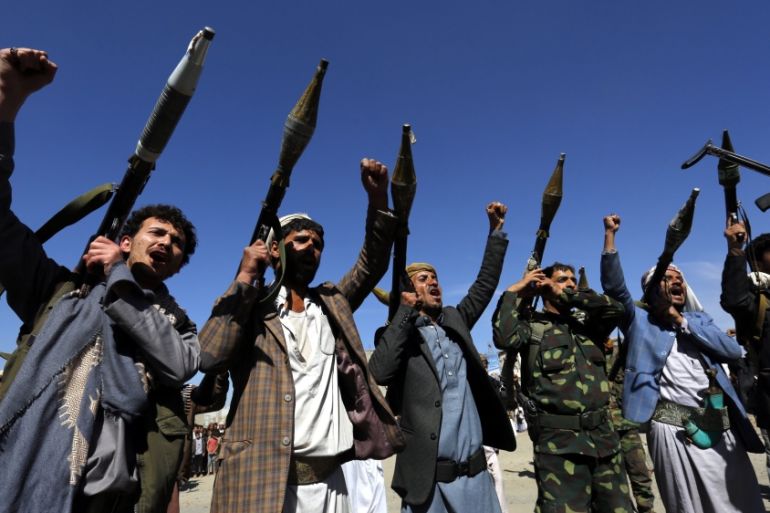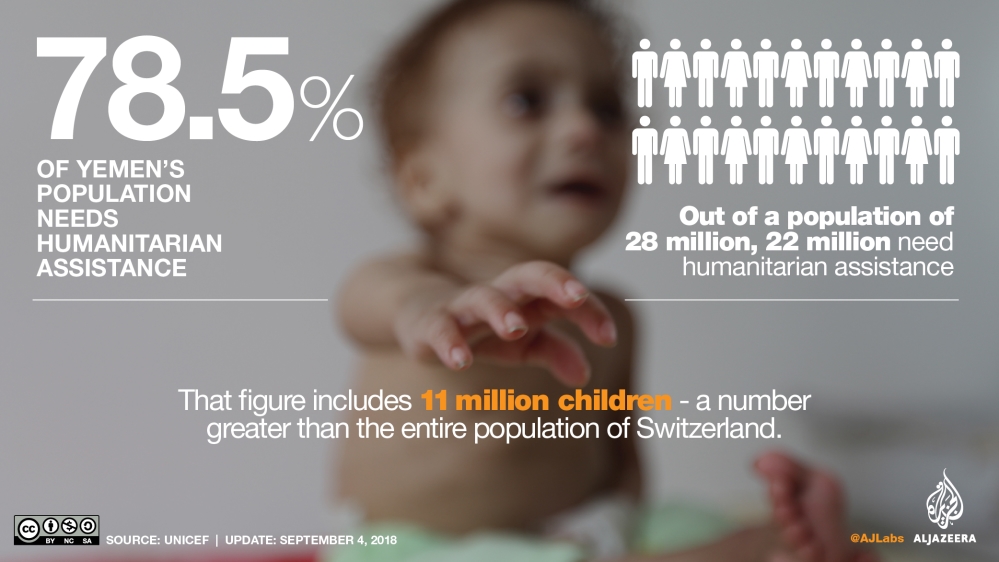Houthis: Only a political solution can end the war in Yemen
Abdul Malik al-Ajri says the rebels want a land, sea and air blockade on Yemen to be lifted at upcoming talks in Sweden.

Stockholm, Sweden – A senior Houthi leader says his group hopes upcoming peace talks in Sweden will end the war in Yemen and lead to an “inclusive political dialogue”.
Abdul Malik al-Ajri told Al Jazeera that the Houthis are hoping to discuss a range of issues at the talks, including the drafting of a new constitution and the decentralisation of power.
Keep reading
list of 4 itemsUS sanctions shipping firm accused of links to Iran, Yemen’s Houthis
Vessel struck in Red Sea as Houthis promise attacks on more shipping lanes
What we know about deadly Houthi attack on cargo ship
“We are hoping these negotiations will help end the war,” al-Ajri said.
“We will be calling for the land, sea and air blockade imposed on Yemen [by Saudi Arabia and the UAE] to be lifted, and for restrictions on goods entering the country to be lifted.”
Saudi Arabia has led a coalition fighting against the Houthis since March 2015, months after they toppled President Abd-Rabbu Mansour Hadi’s government.
|
|
According to the UN, the planned “consultations”, which could start on either Wednesday or Thursday, will be attended by the main “parties to the conflict” – even as Saudi Arabia and the UAE, who play a leading role in the war, and Iran, which supposedly backs the Houthis, are not invited.
However, all three countries, which have considerable leverage over the opposing sides, have said they support the UN’s initiative to end the war, al-Ajri said.
The Special UN Envoy for Yemen, Martin Griffith, has been hoping to get both sides to agree to a “framework” that “establishes the principles and parameters for UN-led, inclusive Yemeni negotiations to end the war, and restart a political transition”.
“Yemen is a small and simple country. It is culturally homogenous and there are no ethnic or cultural divisions,” al-Ajri said.
![Abdul Malik al-Ajri is one of several senior Houthi officials part of the delegation in Sweden [Al Jazeera]](/wp-content/uploads/2018/12/ecac9d1c25714a6e9cce51bb9ca3780b_18.jpeg)
“We hope to engage in an inclusive political dialogue that will lead to a new transitional process.
“Yemen’s need for federalism is so that it can overcome one centre of power and the country’s wealth can be distributed fairly among everyone.”
‘Modest expectations’
International pressure has mounted on Yemen’s warring parties to end the conflict, which has killed more than 56,000 people, according to a recent estimate, and left more than 22 million Yemenis needing humanitarian assistance.
However, one Western diplomatic source told Al Jazeera that it was best to have “modest expectations” heading into this first round of talks.
Both sides neither have the willingness to end the fight and the suffering of the people nor the readiness to make significant concessions.
“I will be happy if they both turn up, meet face to face for a bit, agree on the prisoner exchange, argue a lot but agree to meet again in a month or so,” the source said on condition of anonymity.
Earlier on Tuesday, Yemen’s government said it had agreed to a large-scale prisoner swap with the Houthis as part of a “confidence-building measure”, with reports suggesting as many as 2,000 pro-government forces could be exchanged for 1,500 Houthis.
The breakthrough came a day after the Saudi-UAE alliance allowed 50 wounded rebels to be evacuated from Sanaa to Oman on a UN-chartered plane for medical treatment.
The Houthi delegation arrived in Sweden late on Tuesday after leaving the Yemeni capital Sanaa in a Kuwaiti chartered plane, accompanied by the Kuwaiti ambassador to Yemen and Griffith.
Their arrival was confirmed by Swedish Foreign Minister Margot Wallstrom who wrote on Twitter that she expected the consultations to “take place soon”.
A Houthi official told Al Jazeera that the head of the Houthi negotiating team, Mohammad Abdul Salam, was expected to head to Stockholm on Wednesday. Meanwhile, a delegation from Yemen’s internationally recognised government was also expected to arrive in Sweden later in the day.
The upcoming round of talks will be the second attempt by the UN envoy to bring the rival sides to the negotiating table, just nearly three months after a previous round in September spectacularly collapsed when the Houthis refused to turn up.
Previous talks also broke down in 2016, when 108 days of negotiations in Kuwait failed to yield a deal and delegates from the rebel movement were left stranded outside Yemen for three months.
‘Willingness to end the conflict’
Murad Alazzany, a professor at Sanaa University, said Yemenis were not placing high expectations on the talks.
“Both sides neither have the willingness to end the fight and the suffering of the people nor the readiness to make significant concessions,” he told Al Jazeera.
“Instead, the decisions are being made and imposed by a much larger entity – in this case by the allied western powers led by the US.
“Those major players have made their choice clear and have presented a plan to keep the area in conflict and turmoil to secure more weapons deals and rake in larger revenues from oil sales.”
The war in Yemen has received considerable media attention since the killing of Jamal Khashoggi, a Washington Post columnist and critic of Saudi Arabia’s foreign policy.
Western powers have expressed their anger over the killing and have withdrawn their support from the Saudi-UAE alliance in Yemen in an attempt to communicate their displeasure.
Germany and Norway have suspended arms exports to Saudi Arabia while the US has said it will stop refuelling the alliance’s warplanes.
However, the Trump administration has refused to cancel a planned $110bn arms deal with Riyadh.
Under the leadership of Saudi Crown Prince Mohammed bin Salman, the alliance has launched more than 18,000 air raids on Yemen since they joined the war.
Weddings, funerals, schools and hospitals have been targeted, and the alliance has imposed a raft of punitive economic measures aimed at undermining the Houthis’ grip on power.
According to the UN, the humanitarian crisis plaguing the country means more than 12 million Yemenis will need food assistance next year.
